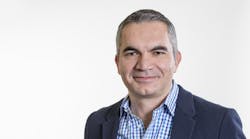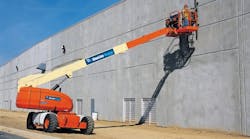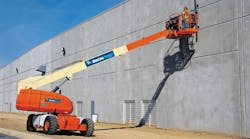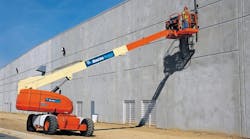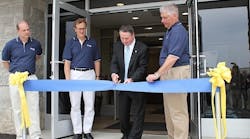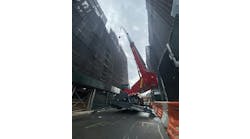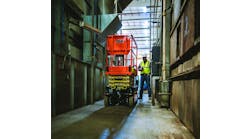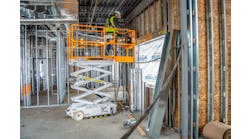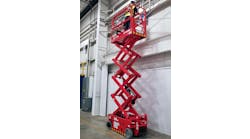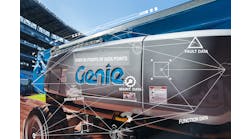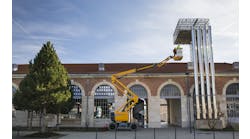RER sat down with new BlueLine Rental CEO Asterios Satrazemis at the Rental Show in Atlanta to talk about the new identity and direction at BlueLine Rental.
RER: Let’s talk about your background.
Satrazemis: I went to the University of Connecticut, came out with an accounting degree and worked for Deloitte & Touche, one of the big accounting firms. I worked a few years there. I had a friend who was a recruiter and he recruited me into United Rentals back in 1998, right at the beginning of it all with all the mergers and acquisitions and I started really at the ground level. Back then we didn’t have digital data rooms, so we got boxes from guys looking for us to buy their business. I had an office that was probably a closet, they stuck a desk in it and I had boxes of paper I had to sift through.
You were in the M&A department?
That’s right. I did that for a while, and then I started working on the front end of the deals, meeting the owners and spending time with them. In that period we did 260 deals, they’ve since done some more of course. We then started doing a lot of the integration, putting them all in the same pricing program and training everyone on the United Rentals approach. That was a lot of fun. BlueLine right now reminds me of United Rentals back in the late ‘90s. There’s a lot of good clay but it needs to be molded. At United I ultimately went from the mergers and acquisition and integration side of the business to actually becoming an operator. I had a district that I ran in Connecticut and part of New York, and then became the regional vice president for the Southeast out of Charlotte and then made the move over to Aggreko in 2008.
Aggreko is a fantastic specialty business, obviously a global business and I started out there running the northern half of North America. I very quickly went to Australia and ran the Australia and Pacific business which was a fantastic experience. I lived in Melbourne, one of the most beautiful places to live, it was great. I had a chance to move that business in the right direction and even bought a business in New Zealand for Aggreko. I moved back, took on North America and Latin America, which was quite a wild ride, learning a lot about the Brazilian economy and a lot of Spanish-speaking economies in Latin America. There at Aggreko you’ve got the rental business, the renting of generators and temperature control equipment. But in the emerging markets, they will do large power plants, 150 megawatts and things like that where you’re powering part of a city. And that’s what you had a lot of in Latin America, it was an amazing experience.
Aggreko brought in a new CEO when Rupert Soames went to go run another business, a gentleman named Chris Weston and Chris asked me to run North America, U.K., Europe and Australia, which kept me busy. That was fantastic as well. And then I got a call again from a recruiter who said “We have an opportunity I’d like you to consider.” I did my due diligence on BlueLine, they did due diligence on me and I decided it was the right opportunity at the right time to come and work for the business and here I am.
How do you find BlueLine so far? It’s a young company, what are some of your goals?
As you know BlueLine really started in 2001 when Volvo decided to dip its toe into the rental market and they began opening franchise operations. And in the late 2000s they bought them all back and bought some companies as well, tried to make a go of it as a stand-alone business, but ultimately sold it in early 2014 to Platinum Equity, the current owners. There’s a great base of operations to work with, 140 locations, 2,000 people, re-branded as BlueLine. The systems are there, we got all the right tools in place, we’ve got Rentalman, we’ve got Salesforce.com, we’re on SmartEquip, we’ve got all the right tools to run a good rental business. Like I keep saying, the clay is all there, it just needs to be molded.
One thing the business didn’t have was an identity. When I took over one of the things I quickly realized was that people still thought of it as “BlueLine, formerly Volvo Rents.” BlueLine needs to stand on its own and have its own identity, so that’s what we started doing. For me, culture is No. 1, and that’s what I focused on. We had 650 of our men and women in Las Vegas for a conference with our salespeople and managers and we launched the new BlueLine. We’re an organization that’s going to be focused on being fast, safe and reliable. Those are the three keys that I constantly come back to. If it doesn’t fall under those three keys, we’re not going to do it.
We’re putting a premium on speed, safety and reliability, reliability being both obviously the reliability of our equipment, but also the reliability as an individual, as a teammate and as a supplier to our customer. That’s been step one, building out that culture, creating this customer-obsessed focus for our salespeople. We had 650 people there. I asked for a show of hands, “How many of you have been here less than a year?” It was half the room. “How many of you have 10 years of more of rental industry experience?” Again, half the room. So really it’s like a start-up that’s got this awesome base to work from. People are really taking hold of this, they’re excited about it; they’re excited to be part of something that has this clear direction around fast, safe and reliable.
One of the things that I’ve been saying as well is we’ve got the heart of an independent, meaning we’ve got the ability to do something that an independent can do, which is make fast decisions, be nimble, don’t allow bureaucracy and red tape to get in the way of doing the right thing for the customer. Don’t let that phone ring more than three times. Pick that up because there’s a customer on the other end of the line. These are all things that we’re spending a lot of time talking about and focusing on.
The organization is going to be 24/7 now. We’ve been spending a lot of time here at the show with vendors, really focused on building a partnership with them. One of the things that I have been talking with vendors about is that a rental company owns a piece of equipment for a very short portion of its lifespan. The manufacturer owns it forever, if you will. Their name is on it for its entire life. So it’s really important for me to look at them as a partner, it’s not to focus on that last penny of savings, it’s to say how can you work with us and how can we work with you to really get the most out of that time that we own that piece of equipment. So that means opening up their training programs for our people, having the right preventive maintenance schedule, thinking through how we can work with their dealers to really have the most amount of uptime on our equipment because when that piece of equipment goes down both of our names are on it, so both our brands are affected. Those are some of the things that we’ve started to focus on and it’s resonating. So the folks in my business are excited and the enthusiasm I’m getting from the vendors on the things we’re talking about has been very refreshing as well.
What are some of your plans for growing the company?
I look at it all market by market, a hyper market focus. That goes back to this heart of an independent. In any given market you can be No. 1, regardless of how big you are nationally. It’s a question of do you have the right footprint, do you have the right people and do you have the right equipment? And so what we’re doing right now is putting a premium on places where we’ve got some decent market coverage and what we’re doing is doubling down in these markets. So we’ll be expanding and opening new locations where we’ve got reasonable market coverage.
The other thing is we’re looking to see where we have some expertise. A good example is we bought Trico prior to me coming on board. Trico is a great aerial specialist. Chris Carmolingo who used to be the president and CEO is on my team. One of the things that I quickly realized is I’ve got a gem sitting here that I’ve got to leverage, so Chris and I have agreed, we’re going to be re-branding the Trico stores as BlueLine Aerial and in 2016 we’re going to be opening a number of new BlueLine Aerial locations around the country. So he’s going to be leading that for me in addition to some other responsibilities in the Northeast. We’ve also got Rob Hepler who has opened more aerial locations than anyone in the industry. He’s going to be leading the aerial sales effort working with Chris.
We’re going to leverage that experience we have in the business. In markets where we’ve got the full line and we’ve got the capability we’re going to increase our clusters and add more locations. In certain cities where we think the opportunity is right we’re going to be adding and beefing up our prior Trico businesses and rebranding them as BlueLine Aerial. So that’s some of the focus we’re moving forward on right now.
With your background in the power generation area, is that something that you might specialize in as well?
Not right now. I love that business, I love Aggreko, it’s a fantastic business, but I respect the specialty nature of that business. When all you do is rent power, temperature control and oil-free air, you need to be a specialist. So I’m going to leave that up to the specialists. So we’re not going to get into specialty rental but we’re going to be using the spirit of that to drive the aerial portion of our business. The biggest portion of our business is going to be the full line general rental but BlueLine Aerial is a nice add-on piece that we’re working on.
When you had half of the 650 people in the room with less than a year with BlueLine, were they new to the industry?
Half of them were with BlueLine for a year or less, but half had 10 years more of experience. So you know it’s a neat opportunity for me to harness that capability. So again back to developing this culture and getting people to believe in that and buy into what that is. It’s 100 percent in our control, our speed, our safety, our reliability is all up to us. So that’s something I just need 2,000 people to believe in and go do every day, and then it’s a question of putting in the right support for people.
So a couple of different things. One, we didn’t necessarily have a unified selling process in this organization so one of the things we kicked off is what I call Selling the BlueLine way, a standard approach to selling that I’ve used, a standard approach for sales people and how to help them drive activity out in the field, making sure they’re out in front of the customers and having good conversations with customers.
Additionally, we’re focused on safety and we’re keeping it front of mind, not just once in a while, but every day all day and that’s a big visible focus that we’re doing using a lot of different tools that I’m familiar with. We’ve seen people really respond well to that. Having folks with that much industry experience really helps because they pick it up just like that. They just gravitate right to it whereas it would be a little trickier if I had a lot of folks that are new to the industry, it would take a little time. I’m confident that because of the mix that we have we can move the needle pretty quickly on a lot of fronts.
Are you putting in metrics to measure speed and safety?
Yes. The other nice thing is that coming in here having had 18 years in the industry now and seeing it in different countries and different continents and different types of businesses, I’ve really come to a handful of things that I think you need to run the business. So basically what I’ve done with my planning team is put in just a handful of KPIs. I put a premium on people being out in the field in front of customers, versus sitting in their offices looking at reports. It goes back to the spirit of an independent. You’re running your own business, you’re not sitting in front of your computer staring at spreadsheets, you’re out there making it happen and that’s what I want my guys to do. Active people getting out there and seeing the customers, giving them a handful of things to look at, on a daily, weekly, monthly basis to help them understand what’s happening with their business so that they can actually take that and do something in their business, not in their office.
How will the current economy affect your business in 2016?
We all have to pay attention to the macro-economics, what is happening in the market place. What I said to my team is that you have to be cognizant about what’s happening in the economy, but we have an opportunity to do more ourselves regardless. A line that I say all the time is either you’re happening to your market or your market is happening to you. And we get paid to happen to our market. We have a lot of opportunity and our plan is to spend more on fleet this year than we did last year.
